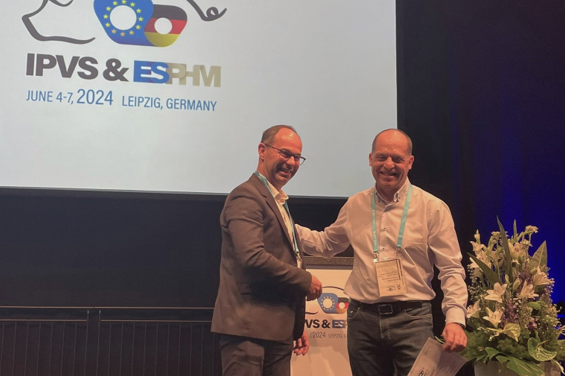Researchers from the University of Lleida (UdL) and Agrotecnio have identified some genetic variants that could have a protective effect against porcine respiratory disease complex (PRDC). These are the results of the national research project Resilmarker, led by Lorenzo Fraile and Romi Pena. This research has been recognised with the award for the best poster at the 27th International Congress of the International Pig Veterinary Society and the 15th European Symposium on Pig Health Management (IPVS&ESPHM), held in the German city of Leipzig.
PRDC is a multifactorial respiratory syndrome related to infection by different pathogens, both viral and bacterial, which reduces pig performance and increases both medication costs and mortality. The research, carried out by the research staff of the School of Agrifood and Forestry Engineering and Veterinary Science (ETSEAFiV) of the UdL, has analysed a thousand fattening animals from 10 farms affected by outbreaks of PRDC, confirming the presence of porcine reproductive and respiratory syndrome virus (PRRSV) and the bacteria Streptococcus suis or Actinobacillus pleuropneumoniae.
By genotyping a panel of 17 polymorphisms (variations in gene expression), the team has been able to identify genetic markers that could be used in the selection of pigs with a better predisposition to cope with the respiratory complex. “The selection of favourable alleles for MX1, RNASEL, GPB1, GBP5, SGK1, HDAC6 and MRMN1 have a protective effect against PRDC,” says Agrotechnology and ETSEAFiV researchers.
“Our study opens the way to define panels of DNA markers that can contribute to the selection of PRDC-resistant pigs,” says Fraile. However, further research is needed. “Future work should aim to validate these results in other pig production systems and study their interaction with other pathogens and environmental factors,” he adds.
The prize for the poster, entitled Screening DNA markers to improve resilience to PRDC outbreak, consists of a free registration for the next ESPHM and IPVS congresses, considered the most important in the world in the swine field.
Text: Premsa UdL / Agrotecnio

